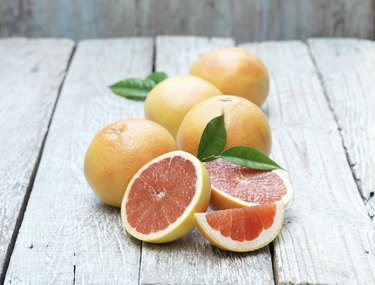
If you've ever had a bacterial infection, your doctor has likely prescribed you an antibiotic. These medications are designed to destroy bacteria and slow bacterial growth, but if you don't know which foods to avoid when taking antibiotics, you may not get the best results.
Avoid These Fruits on Antibiotics
Video of the Day
When taking antibiotics, it's absolutely paramount that you understand which foods to avoid eating. Certain foods can inhibit absorption of the medication, while others cause nausea and other unpleasant side effects, such as diarrhea, vomiting, and more.
Video of the Day
Most notably, you should avoid consuming grapefruit while taking antibiotics. According to doctors at the Mayo Clinic, dangerous interactions arise between antibiotics and grapefruit because chemicals in the fruit interfere with the way enzymes metabolize the medication. This means that the medication could potentially stay in your body for too short, or too long, a time, rendering it either useless, or else potentially lethal.
Don't go thinking that you can just take your medication hours before, or after, grapefruit consumption. Whenever you are prescribed antibiotics — especially for high cholesterol, high blood pressure, or heart problems — it's best to avoid the citrus fruit altogether for the duration of the prescription, as well as the 24 hours before and after you start your course.
Furthermore, grapefruit isn't the only red-flag fruit — Seville oranges can cause the same effects. That said, be sure to double (and triple) check your nutrition labels to make sure everything is free from grapefruit additives or citrus flavorings that could contain extracts from grapefruit or Seville oranges.
Read More: Allergic Rash From Antibiotics
Food Drug Interactions on Antibiotics
A not-so-obvious food-drug interaction to be aware of when prescribed antibiotics is that which can occur with natural herbal supplements. While you might assume that herbal supplements must be fine to take with anything, given their natural nature, the fact is that they can interact negatively with the heart, and with blood pressure, when you're using antibiotics.
According to the Mayo Clinic staff, many supplements (most of which are ignored by doctors when they're prescribing, based on false assumptions of their safety) interfere with the effectiveness of common heart medications, like the blood thinner Warfarin.
If you regularly consume dietary supplements, play it safe by avoiding danshen, licorice, St. John's wort, coenzyme Q-10, evening primrose, garlic, ginseng, saw palmetto, hawthorn and ginkgo biloba, as all of these impact the effectiveness of antibiotics, and can lead to an increased risk of bleeding, low blood pressure, irregular heartbeat, and more.
In addition to avoiding herbal supplements (or, at very least, being aware of their side effects), people taking antibiotics should avoid using alcohol. According to James M. Steckelberg, MD, from the Mayo Clinic, consuming alcohol while taking an antibiotic prescription can lead to symptoms of dizziness, drowsiness and nausea, and can reduce the speed at which you recover from the underlying illness.
Read More: Antibiotics Recommended for Infected Wounds
Foods to Eat With Antibiotics
If you often experience nausea when taking antibiotics, consider strengthening your gut's microbiome with healthy bacteria obtained through probiotics, prebiotics and fermented foods. Drinks such as kombucha (e.g., Health-Ade Kombucha) and all sorts of yogurts (e.g., Stonyfield Organic Probiotic Yogurt Smoothies) are great options.
While there is no research backing the claims that these foods help with antibiotic-related nausea, The American Council on Science and Health (ACSH) says it can't hurt. After all, if you consume antibiotics, they're designed to destroy the bad bacteria in your gut. This often takes a lot of the good bacteria with it. Replenishing it with healthy yogurts and drinks is a simple home remedy worth trying to see if it helps in your case.
If you find that consuming probiotics and prebiotics doesn't deliver the soothing, health-boosting effects you're searching for, be sure to check in with your doctor for additional antibiotic food recommendations. They'll be able to tell you specific foods to consume, and avoid, based on your particular antibiotic prescription.
- Mayo Clinic: "I like to drink grapefruit juice but hear that it can interfere with some prescription medications. Is that true?"
- Mayo Clinic: "Herbal supplements and heart medicines may not mix"
- Mayo Clinic: "What are the effects of drinking alcohol while taking antibiotics?"
- The American Council on Science and Health: "Should You Take Probiotics When You're On Antibiotics?"